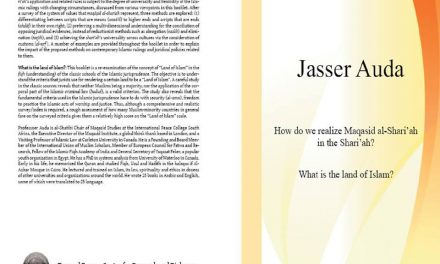
Most Arabic societies are multi-religious. For example, in Egypt, the Coptic community constitutes an estimated 6% of the total population. When Coptics hear about “the application of the Law of God” or about an “Islamic State”, they fear the loss of citizenship rights or the principle of equality amongst the citizens. At times, this fear may be legitimate due to what appears in some of the media statements or some of those affiliated to the Islamic groups, even though they are a minority.
On the other side, there is a great majority of Egyptian Muslims, for example, who absolutely cannot accept the same statements and hold same concerns and fears regarding citizenship rights and the principle of what they call “the civil state”. The question here is: Is there a conflict between the “religious” (Islamic in our case) and the “civil”? And what is its relation with Non-Muslim citizens?
The answer to this question should be a detailed answer and not simplistic. However, the quick answer is: There is no conflict between the concept of “civil” and the concept of “religious” if we imagine the spaces of religious and civil in circles as it appears in the following diagram.
The relation of the civil and the religious between participation and differentiation
We often view the meanings in pre-determined binary dichotomies as if they were black and white. However, in fact, there is a wide and natural grey area between the black and white colors. What we need here is to achieve the “civil” through the religious by perceiving the “religious” as one of the components of the “civil”. We also need the civil to be a tributary to the religious and one of its forms, and by this the religious and civil concepts would both be equally expanded and not put in conflict in a simplistic manner.
However the political theory, especially in many of its dominant western theories, defines the “civil” as irreligious, and this is applied especially to Islam! This theory is adopted by people such as Samuel Huntington, Albert Hourani, Bernard Louis, Elie Kdouri, Mahran Kamrava and other Neoconservatives and their followers.[1] However, this is generally not true, especially in the Arab and Islamic contexts. People of the Middle East and Muslim-majority countries value religion –every religion- as an important factor to their civil life and its growth. We cannot definitely separate civil life from religion in that part of the world.
I suggest that we distinguish three kinds of concepts which must be explained:
- The absolute religious: this constitutes the religious components of the people of religion alone and has nothing to do with the buildup of the state, public institutions, or the law, such as the matters of faith and the issues of the permitted and the illegal (halal and haram issues), or issues not related to the state and law. This space is not an Islamic one only, but a Christian one as well, and each religious group is free to practice its own religion within that space, as long as these practices do not violate public order!
- The absolute civil: this is related to the state and its official and semi-official institutions which do not directly overlap with the religion, such as the form of the state, the division of different authorities and the organizing laws of the individuals and groups that are not directly mentioned in details in religion. This is related to the human actions or the world affairs. This section however is related to religion (Islam here) through the principles and the general overall objectives, ethics and values which control the citizen’s dealing, his/her behavior and perceptions, without the need of expressing these principles and values in detailed definite provisions or laws, such as justice, equality and various freedoms, and other aspects that are included in Islam within the general provisions and the ethnic principles and the legitimate rights. Anyone can approach this space from a humanitarian philosophical background and abstract rationality, or from an Islamic background which shares the values and principles of this space, but is a pure civil space so to speak.
- Religious-civil: this is a circle (or a grey space if you wish ) in which the civil and religious are mixed together, or in other words there are special detailed provisions of religion related with the state or one of its institutions or the relations of the citizens in details. These religious provisions are, in origin, meant to become general applicable laws by everyone. Here arises the problem of the civil and the religious because the transforming of the legal provisions (Islamic in this case) to laws applied by the Muslim only, or the Muslim and non-Muslim equally, is an issue which requires details.
I suggest here to divide this space (religious – civil) to three distinct sections which might form a common framework that is broadly accepted; this allows us to avoid a conflict and a societal division with severe consequences:
First: the religious-civil section in which each religious group can refer to their religion:
In personal affairs, the majority of the Egyptians, Muslims and Christians, Islamic and liberals, do not accept the idea of “civil marriage” or the marriage of a couple who agree amongst themselves without referring to the religious provisions (Islam or Christianity)in legalizing that marriage, its conditions and various deterrents as in the case of the interpretations of the concerned religious bodies. Thus the department of personal and family status of authorities and laws and institutions, and the issues of inheritance, alimonies and relationship etc., should have the superior word of the legal jurisprudents who are experts of laws in each religion, and who represent ( in the context of appropriate and contemporary interpretations) the acceptable religious opinion whether in Islam in Al- Azhar and its scientists in general, or in Christianity in the various churches in its known references.
Second: the religious- civil section which is applied to everyone according to a societal accord:
This is a space of religious provisions (Islamic here) which all agree that they are the best for the common interest even though it were of Islamic origin specifically, such as punishment of the killer the “penalty of the willful killing” in the Islamic Principles. Although it was an “Islamic law”, it was agreed upon by the society and became the applicable law for both Muslims and Non- Muslims. Examples include the penalties imposed by the law on disgraceful actions and being drunk in public roads, or publicly announcing not fasting in Ramadan, or other law provisions agreed upon in the society.
There are also the laws that organize the houses of worship in spite of the difference between Muslims and others due to the difference in percentage of the population, the demographic distribution, the official Islamic or Christian holidays, as well as the authorities of mosques and Islamic endowment and the official Egyptian pilgrimage missions supported by state, and other similar things. Issues In this space must be referred to the “legislator” who represents the people. All the various sensitivities whether Muslims, who are the greatest majority, or the feelings of the minority should be taken into account.
In addition to that there is the general and important constitutional material which makes the law the main source of legislation. This is an important material which is agreed upon by the society (or the largest majority of it) since decades without prejudices to the specificities of Non- Muslims, which is a matter related to the identity according to the majority of Egyptians which cannot be compromised.
Third: The religious – civil section not agreed upon by the society:
This is the complicated space in the Islamic concepts, which must have clearly a special sensitivity among the Islamic due to the fact that the source of laws or the institutions is the Islamic principles in this case. However, the Egyptian societal agreement did not take place and was not completely accepted through which the Islamic religion can be transformed to an applied law or one of the state institutions, such as someone calling that the state (the Egyptian state here) should collect taxes from Non- Muslims, or not to allow non- Muslims to participate in Military service or to nominate for presidency or be appointed in the judicial service, or that the state would impose the Islamic rituals and its private aspects upon all, or to apply the Islamic law penalties over the various crimes, etc.
Islamic concepts should be aware In this space of the danger of losing the societal agreement on what is needed. The Islamic concepts as well should expand the horizon of work and get out from the spaces of rationing and legislation of sanctions to the spaces of education and culture. The general Islamic proprieties for example can be achieved in the society through the educational and cultural Islamic institutions and through the awareness, media and mosques, and should not be transformed o laws for punishing the violators. How can Islam be imposed through the law and the institutions of the state? Shouldn’t the schools, mosques and endowments have the first right in that?
Thus the general discipline, as I suggest in those divisions, must be built on the civil agreed upon and does not conflict in any case with the societal agreement which is an inevitable practical and legal basis.
If we look to this matter from the doctrinal context which was called Dar Al-Islam, scholars say that certain meanings if achieved the whole earth would be Dar Al- Islam, while if other meanings were not achieved (regardless of the majority and minority) then the Dar will not be Dar Islam. These are familiar matters in our heritage. The issue of the majority was not mentioned by any of the scholars but they rather talked about “ the rule of Islam” and the emergence of rites, security, justice and other moral standards.
The rule of Islam is the rule with justice essentially, in addition to some details mentioned above such as the issues of personal status and the inheritances etc.. Worshiping rites mean discipline whatever it is would be a discipline which allows the Muslim to worship and complete the rites of Islam such as the Adhan (call for prayer), Friday prayer, holidays prayer, building Mosques, sacrifices, pilgrimage, reading the Quran and other various forms of rites which if fulfilled and achieved in the society then the earth becomes Dar Islam regardless of the minority or the majority. Imam Abu Haneefah has very precious words in the security issue. He says:
What is meant by adding the Dar to the Islam and the infidelity are not really Islam and infidelity but security and fear[2] .
This means that the issue of “Dar Al- Islam” we seek is about security and non-security, and if we wanted to establish an “Islamic society”, these meanings must be achieved within it. These meanings essentially are religious meanings and principles but are at the same time civil, and might be agreed upon by the Islamic with Non- Muslim and with the Muslim who is not Islamic as well.
As a Muslim I believe in justice. I believe that justice is God’s law and the non- Muslim who calls himself a liberal, whether he was a Muslim or a non- Muslim, believes in justice as well, though we might be different in some details. This is a useful and good subject to discuss. Some forms of the provisions in my belief might be different from his, but we and the society might agree over these principles. This provides us with a vast common space for movement and reform and for the buildup of the society without losing our efforts in discord and conflict which is of benefit only to the enemies at home and abroad.
A very important and final point in the issue of “the civil state” is the concept of “civil service”. In the buildup stage there must be a critical separation between the policy spectrum and its different aspects and between what is called civil service. This is a professional service which is not limited to the institutions of the civil and philanthropy community. Civil service in the developed states is the service in several authorities that represent the spinal cord of the state such as the scientific research bodies, universities, judicial bodies, technical bodies and all the other independent and semi -governmental ones upon which the society is established essentially.
We see that if there were any constitutional or parliament problematic in the developed states, without a government for example for several months, the society will be run in an automatic, secure and continuous way. This contradicts with the conditions we are in because the civil essential services which we are talking about are stable regardless of the performance or even the presence of the government. This civil service is affected naturally with the policy on the strategically level alone not the daily procedure; and if the government changes from the right to the left for example, the society will move to the left on the long run but not immediately, and the movement of the society and the civil institutions will not be dependent only upon the spectrum and colors of the government whatever it were.
We are plagued by authoritarian rulers who wanted to control everything and thus they mixed up between the political and the civil until the political controlled the civil society itself. In all the civil, scientific, media, technical and educational bodies, and even the teacher of the Kindergarten, the Friday speaker, the sports coach, the newsletter announcer, and the university professor, all these were appointed, promoted, fired or punished by that ruler and his security body forcibly. If we wanted to have a civilized civil society in the contemporary sense, we must separate between the civil life and between the inconstancy and spectrum of the policy until stability occurs and development becomes steady.
Egyptians had a leading experience in the independent civil service from the government. It was the experience of “public committees” during the revolution. When the Egyptian police leaders committed unfortunately the national treason which was represented by the withdrawal of security personalities from all the Egyptian streets, leaving the people to face the thugs and the remnants of the former regimes, “the public committees” were the safety valve that prevented the collapse of the Egyptian society. The people formed in an automatic and simple way, groups of youth, men and girls to protect their homes and streets and to organize the traffic. After that they started to offer some of the essential security, social and legal services to continue the lives of the citizens under the quasi-absence of the state for many months after the success of the revolution.
These committees were the safety valve of the revolution and one of its most important gains. The reason was that it was not limited to the services only but expressed the opinions of the citizens related to their essential rights without any specific party or ideological politicization other than the support of the civil rights of mankind, and the contribution in raising the level of social justice by securing the essential rights for the citizens, and the support of the civil values such as cooperation, solidarity, tolerance and volunteering. All these are original Islamic values and principles of the Islamic law.
[1] Refer to: Carapico, Sheila (1996). “Yemen Between Civility and Civil War,” in Civil Society in the Middle East, ed. Richard Norton, vol. 2. Leiden: Brill, Carapico 1996, p. 288.
[2] نقله علاء الدين الكاساني، بدائع الصنائع، دار الكتاب العربي، ط2، بيروت، 1982م، ج7، ص131.





